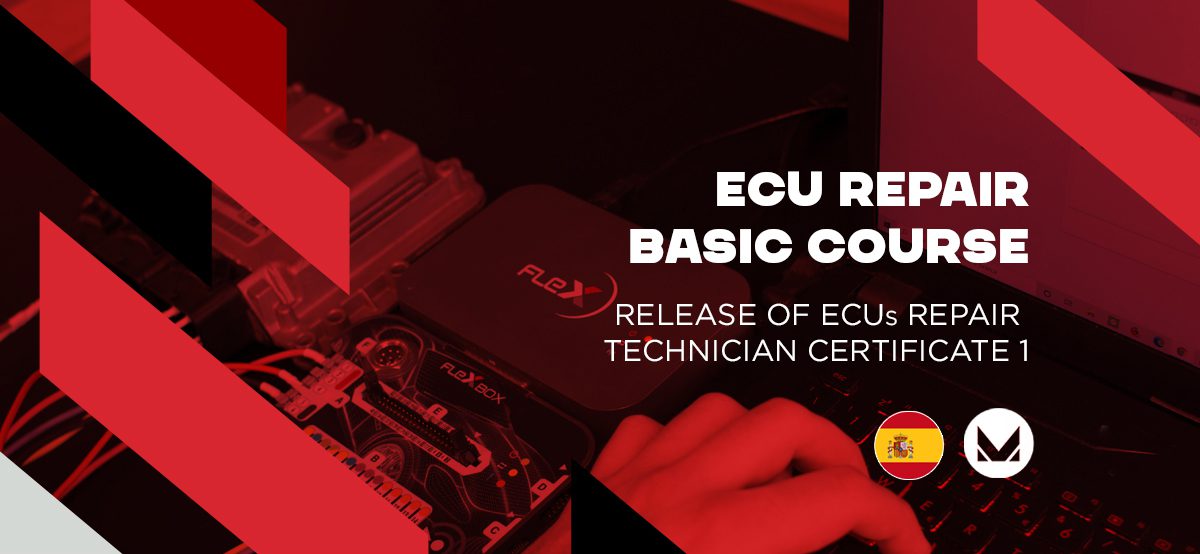
Basic ECU repair course, Madrid – Spain
Basic Repair Course
The Automotive industry is evolving, the implementation of electronic systems that limit the service in workshops and the automotive electronics laboratories. Recent developments in this field require the total updating of the procedures, techniques and methods used by an effective professional in mechanics and electronics. With COP-Electronics, in collaboration with Magic Iberica S.L., we bring together all the means to convey the most modern and updated technology to our students.
Goals
The main objective of this course is to teach students a wide selection of techniques applied to the different vehicle’s electronic modules, where students proceed in complete autonomy, providing updated solutions to all jobs that are required in today’s workshops. Saving time on diagnoses and inexpensive repairs.
Requirements
Basic knowledge of mechanics.
Professional Outlets
Training with this technical course allows you to have professional opportunities such as:
- Automotive electronics laboratory technician.
- Advanced vehicle diagnostics.
- General garage work for vehicles.
Certificate at the end of the course
ECU repair Technician Diploma 1
Course Program
Module 1. Understanding unit identification
- 1.1 Identification of units.
- 1.2 Analysis of the BOSCH nomenclature in Diesel and Petrol units.
- 1.3 Analysis of the different ECU families.
- 1.4 Analysis of the different variants of units, depending on the injection systems.
- 1.5 Classification of the different ECU generations based on the year of production, components and reading and writing paths.
Module 2. Knowledge of the main components that make up an ECU.
- 2.1 Atomic structure and units of measurement constituted in electronics.
- 2.2 Knowledge of the components of a Unit.
- 2.3 Knowledge of passive components. Identification of each of them and what function they perform within an ECU.
- 2.4 Knowledge of the active components. Identification of each of them and what function they perform within an ECU.
- 2.5 Identification of immobilizer inside the units.
- 2.6 Identification of maps / cartographies within the units.
Module 3. Knowledge of unit structure
- 3.1 Electronic architecture of ECUs.
- 3.2 Block diagram of Diesel and Petrol units.
- 3.3 Analysis of unit blocks.
- 3.4 In-depth study of the internal structure of 1st and 2nd generation Diesel units.
- 3.5 In-depth study of the internal structure of 3rd and 4th generation Diesel units.
- 3.6 In-depth study of the internal structure of the Petrol units.
Module 4. Diagnostic Imaging
- 4.1 SMD and tantalum capacitors.
- 4.2 Capacitors in the filter circuit.
- 4.3 Rectifier diodes, protection and Zener diodes.
- 4.4 PNP / NPN, Darlington, Mosfet and IGBT transistors.
- 4.5 Digital Electronics and Communications.
- 4.6 Main memories used in the units.
- 4.7 EPROM memories.
- 4.8 EEPROM memories.
- 4.9 Microprocessors.
- 4.10 Basic principles of the oscilloscope.
- 4.11 Using the COP-TRAZER.
- 4.12 Verification of faults in various unit blocks.
- 4.13 Practical cases for checking and repairing the throttle body controller driver in a petrol unit (the vehicle starts, but does not accelerate).
- 4.14 Diagnostic imaging of vehicle sensors and actuators.
- 4.15 Diagnostic imaging of burnt wires or corroded connectors.
Module 5. Diagnosis of bench units.
- 5.1 How to bench program a unit
- 5.2 Diagnosis of the units via Pin-Out.
- 5.3 Signal emulation for the units.
- 5.4 Diagnosis of localized faults in injection systems.
- 5.5 Diagnosis of localized faults due to lack of communication with the unit.
- 5.6 Diagnosis of faults identified by polarity inversion in the battery.
- 5.7 Diagnosis of faults in 1st and 2nd generation Diesel units.
- 5.8 Fault diagnostics in 3rd and 4th generation Diesel units.
- 5.9 Diagnosis of faults in petrol units.
Módulo 6. Practice.
Study Methodology
Where theory merges with practice to achieve optimal results, in small groups of up to 10 people and practicing with real units.
Duration and Times
The course lasts 24 hours, divided between Friday, Saturday and Sunday.
Lesson hours are from 09:00 to 14:00 and from 15:00 to 18:00
We help you
Once the course is over, we do not leave the student alone on this new career path. We offer a technical assistance to help solve any problems or doubts you might have.
Price
Total price of the course is € 1260.00 + VAT
This price includes hotel accommodation, located 400m from the course venue and lunch for the duration of the event.

 English
English  Italiano
Italiano  Français
Français  Deutsch
Deutsch  Español
Español  简体中文
简体中文 